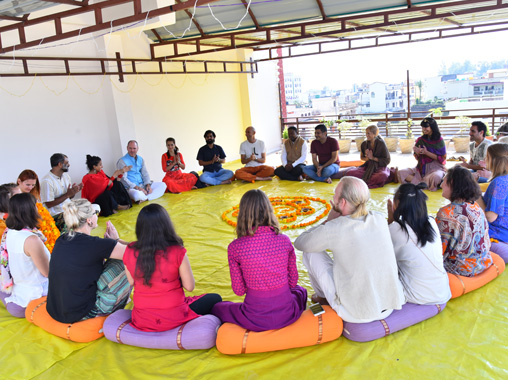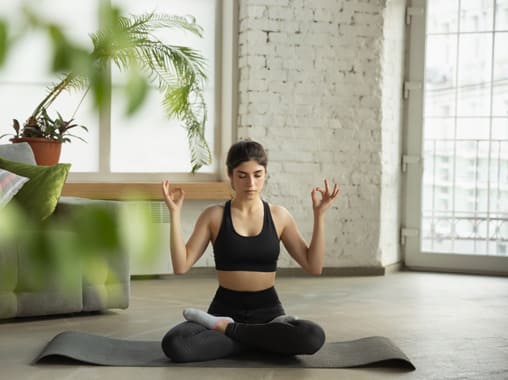There’s a lot of evidence that Yoga and Meditation can be good for your mental health. But are there any practical ways you can incorporate this practice into your day-to-day life? AlakhYog School breaks down the specific steps to help yourself build resilience in all aspects of life, whether through simple things like practicing self-care or something more complex. Our 200 Hour Yoga Teacher Training in India provides meditation that enables you to “remember your humanity,” which helps you act more ethically and compassionately in your daily life. We also describe how meditation helps people develop “personal resilience that can protect against burnout and collapse under stress.” If you’re interested in building resilience, read the full instructions here.a
What Is Resilience?
Resilience is a state of being that enables you to bounce back from difficult events, challenges, and setbacks with strength and determination. It’s the ability to withstand stress, setbacks, and difficult times and keep moving forward.
When it comes to building resilience, a few key ingredients can help you stay strong: mindfulness, exercise, sleep, and nutrition. Asana and meditation are excellent ways to promote mindfulness and improve overall well-being.
Mindfulness is the practice of paying attention in a non-judgmental way to what’s happening in the present moment. It can help you develop an awareness of your thoughts, feelings, and sensations and can help you focus on the task at hand.
Exercise effectively boosts resilience by improving your mood, mental health, and physical health. Exercise has been shown to decrease feelings of sadness, anxiety, and depression and improve cognitive function. It has also been shown to increase feelings of self-worth and well-being.
Sleep is essential for both your mental and physical health. A lack of sleep can lead to decreased moods, increased aggression, and impaired judgment. Yoga has been shown to improve sleep quality and quantity. It can help you relax your body and mind, which can help you fall asleep faster. Meditation can also improve sleep quality by helping you focus on your breath and reducing stress levels. Both practices can also increase your sense of well-being.
How Yoga and Meditation Can Help with Building Resilience?
Like most people, you probably think of resilience as a personality trait. You might imagine someone who’s incredibly tough and can bounce back from anything. But that’s not really what resilience is about. Instead, resilience is about handling stress, pain, and adversity well. It’s about having the strength to get through tough times.
There are many ways that Yoga and Meditation can help build resilience. First of all, they can help you learn how to control your emotions. This is important because it teaches you how to deal with stress healthily. Yoga also helps you improve your body and mind connection. This means that you can better control your own physical and mental health. Finally, yoga and meditation can help you develop a sense of calmness and detachment. These qualities are essential for dealing with difficult situations head-on. When you’re dealing with difficult emotions, the last thing you want to do is eliminate them.
Many people think that suppressing your emotions is the best way to get rid of them. Instead, you want to keep these feelings in a healthy place. Emotions are usually helpful and predictable things that can direct us toward a positive outcome. However, some people may get too emotional and lose their perspective on life. This is why it’s important to stay calm when difficult situations stress you out. When you learn how to control your emotions well, it will help you build up your resilience. It’s also important for building self-esteem and self-confidence because they often go hand in hand with resilience. Many Yoga Schools in India are designed specifically to help.
Benefits of Yoga and Meditation for an Individual’s Mental Health
Asana and meditation are both ancient practices that have been found to have a plethora of benefits for an individual’s mental health. Both practices can help to improve your focus, concentration, and mental resilience. Alakh Yog explore some of the key benefits of yoga and meditation for an individual’s mental health.
Yoga and meditation can help to improve your focus, concentration, and mental resilience.
Both practices can help to reduce stress and anxiety levels. Yoga has increased oxytocin levels, which is known as the “cuddle hormone.” Oxytocin is responsible for enhancing social bonding and reducing anxiety. Meditation has also been found to increase oxytocin levels, but to a lesser degree than yoga. Meditation has been shown to increase serotonin levels, known as the “happy hormone.” Serotonin is responsible for regulating mood and enhancing feelings of happiness.
Yoga also helps to improve your flexibility and balance. These skills can help you maintain your equilibrium in difficult situations or physical activity. Yoga also strengthens your spine and arms, which can reduce pain in the neck, back,
The Importance of a Mindful Lifestyle
The benefits of mindfulness have been well-documented, but what are the specific effects of meditation on the mind and body? According to a study published in Scientific Reports, practicing mindfulness can help you build resilience to stress. In 100 Hour Yoga Teacher Training Course, participants who were taught how to meditate were more resilient when faced with stressful situations than those who did not receive any instruction.
Mindfulness helps us disconnect from negative thoughts and emotions, leading to improved mental health. By focusing on our breath and observing our thoughts and feelings without judgment, we can learn to respond more effectively to stress in our lives. The practice of mindfulness has been shown to improve our moods, focus, concentration, and communication skills.





